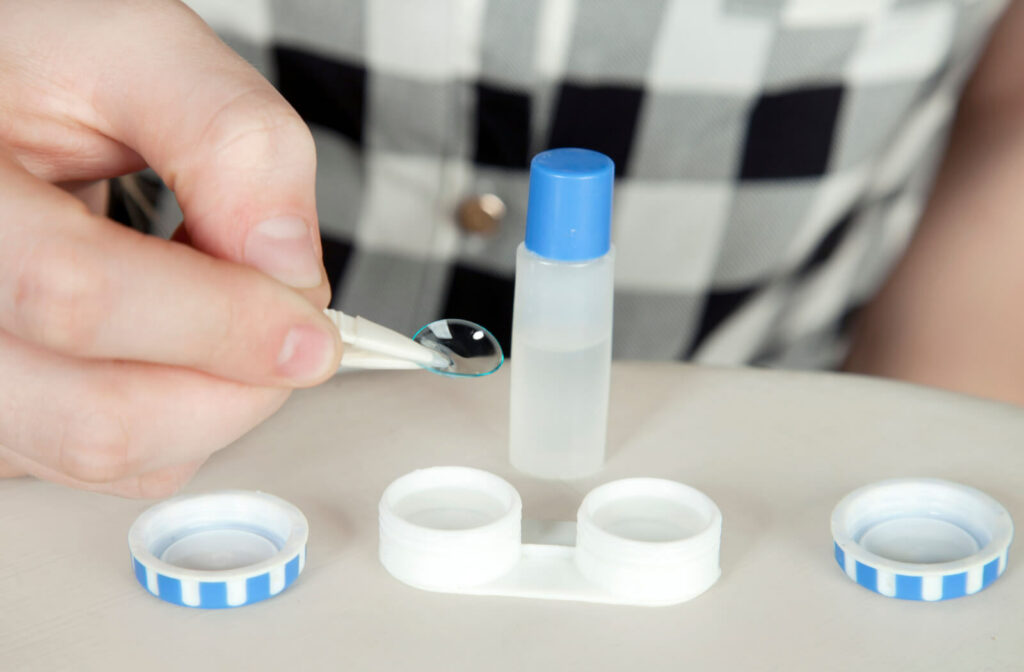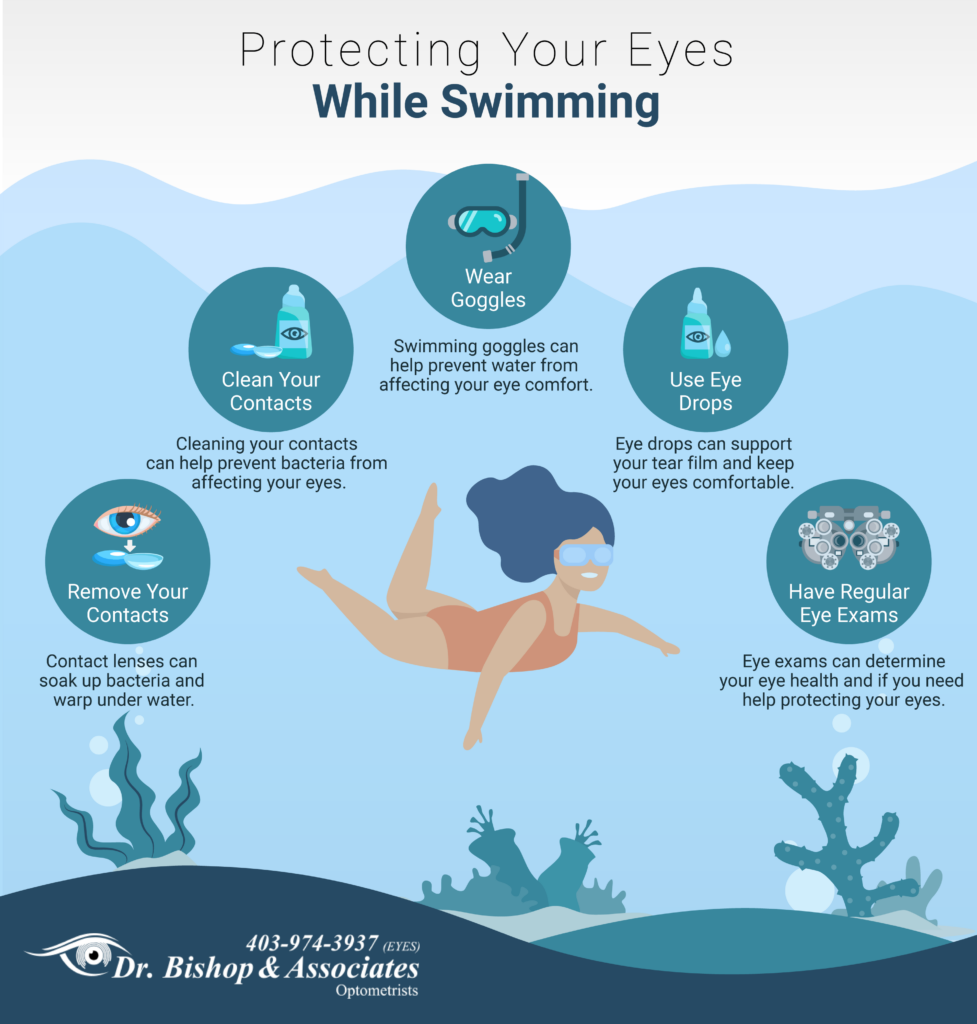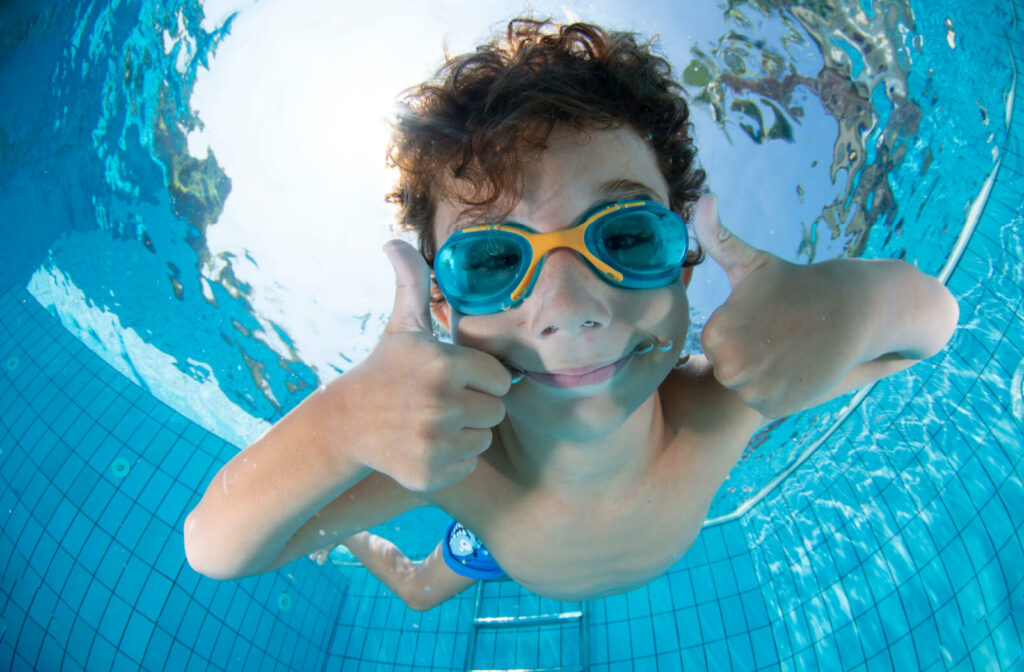If you like an on-the-go lifestyle, contact lenses may be a great way to support your sight! By untethering yourself from traditional eyewear, you can enjoy clear, comfortable vision while playing sports or hiking our beautiful Albertan landscape.
But can you wear contact lenses while you go swimming? What about when you’re taking a shower?
Before taking a dip into the nearest pool, lake, or river, spend a moment today reading up on the effects swimming can have on your contact lenses and eye comfort.
We believe education is key to protecting your eyes and preserving your vision, so if you have any questions regarding the eyewear you use or your eye health, don’t hesitate to contact the team at Dr. Bishop & Associates today!
Why Water & Contact Lenses Don’t Mix
In almost every situation, we do not recommend wearing your contacts while swimming or showering. The reason is that most types of water, including water found at home, public pools, lakes, and rivers, have some degree of bacteria.
Because your contact lens covers a portion of your eye, it can soak up water and cause an infection. In addition to the bacterial risk, water can also warp the shape of your contact lenses, causing discomfort and irritation. In some cases, warped contact lenses could also scratch your cornea, leading to possible pain and vision problems.
Acanthamoeba is a common bacteria found in water, and it can lead to Acanthamoeba keratitis, a type of eye infection that can take as long as a year to treat. For all intents and purposes, if you’re planning on being in or around water, please remove your contact lenses.
How Swimming Can Affect Your Eyes & Contacts
A question you could have right now might be, “If I don’t wear contact lenses, are my eyes still at risk for infection?” And the answer is yes.
The tear film is responsible for hydrating your eyes and protecting them from harmful bacteria and debris. However, when you swim, chemicals and bacteria can affect the stability of your tear film, allowing an opportunity for infection and discomfort.
If you’re wearing contacts, though, the risk is higher. Some of the most common issues that can come from swimming with contact lenses can include:
Eye Irritation
Irritation is the most common issue you can experience while swimming and wearing contact lenses. Water can warp the shape of your lenses, and chemicals like chlorine can seriously affect your eye comfort.
Eye Infections
Contact lenses can soak up the chemicals and bacteria they’re exposed to, increasing the risk of developing an eye infection. A common issue people can experience is conjunctivitis, or pink eye, but a more serious concern is Acanthamoeba keratitis, an issue that can take up to a year to treat.
Corneal Ulcers
You could develop a corneal ulcer when your cornea becomes inflamed or infected by chemicals or bacteria.
A corneal ulcer is a type of sore that can cause pain, irritation, and light sensitivity. Corneal ulcers can sometimes make it difficult to open your eyes. Without treatment, a corneal ulcer could permanently affect your vision.
How to Protect Your Eyes While Swimming
The key to keeping your eyes safe and healthy while swimming is having regular eye exams. Even if your vision is clear and comfortable, you might have a higher risk of developing eye problems while swimming if you wear contact lenses or if you have an unstable tear film.
Everyone should enjoy a refreshing swim now and then, but it shouldn’t come at the expense of your eye safety. We can recommend a complete strategy to help protect your eyes while you swim, with some of our most common recommendations being:
Remove Your Contacts
When you plan to dip into a pool, lake, hot tub, or river, please make sure you remove your contact lenses. As we’ve mentioned in this blog, all water contains some degree of chemicals and bacteria that can soak into your contact lenses and cause numerous eye health concerns.
You can, however, wear daily disposable contact lenses while swimming as long as you replace them with a fresh pair as soon as you get out of the water. To avoid going through your entire supply of contacts, we recommend wearing a pair of goggles if you plan on going back into the water.

Clean Your Contacts with Lens Solution
Life happens, and it’s possible to accidentally forget to remove your contact lenses before taking a dip in a pool. If this ever happens, please remove your contacts as soon as you can and clean them with their proper lens solution.
Proper lens cleanings can help remove harmful bacteria and chemicals from your lenses and protect your eyes.
Use Eye Drops
If your eyes have a higher risk of developing dry eye or an eye infection, we might recommend using eye drops after swimming to help remove harmful bacteria and chemicals from your eyes.
Wear Goggles
Although the risk is relatively small, chemicals like chlorine could affect your eye comfort even if you aren’t wearing contact lenses. In these cases, we recommend wearing swimming goggles to protect your eyes.
We can also offer prescription goggles so you can enjoy clear vision while swimming. In fact, you can purchase your very own prescription swim goggles when you visit our online store by clicking here.
Use Prescription Eye Protection
If you’re an outdoorsy type that finds themself in rainy or wet weather from time to time, wearing safety glasses can help protect your eyes and contact lenses from water. Please speak with our team about our selection of safety glasses and find out how we can protect your sight today.

Protect Your Sight
Whether taking on the waves at Southland Leisure Centre or relaxing at any of our scenic Albertan lakes, it’s always important to protect your eyes.
If you’re struggling with contact lens comfort, please book an appointment today to find out how our team can help. We’re always ready to see you.




